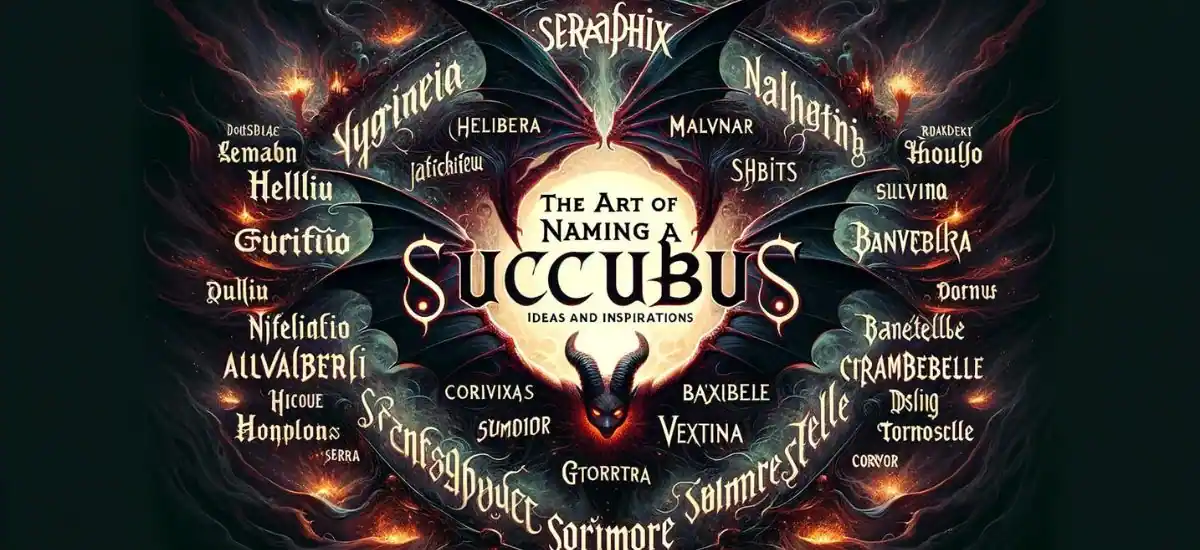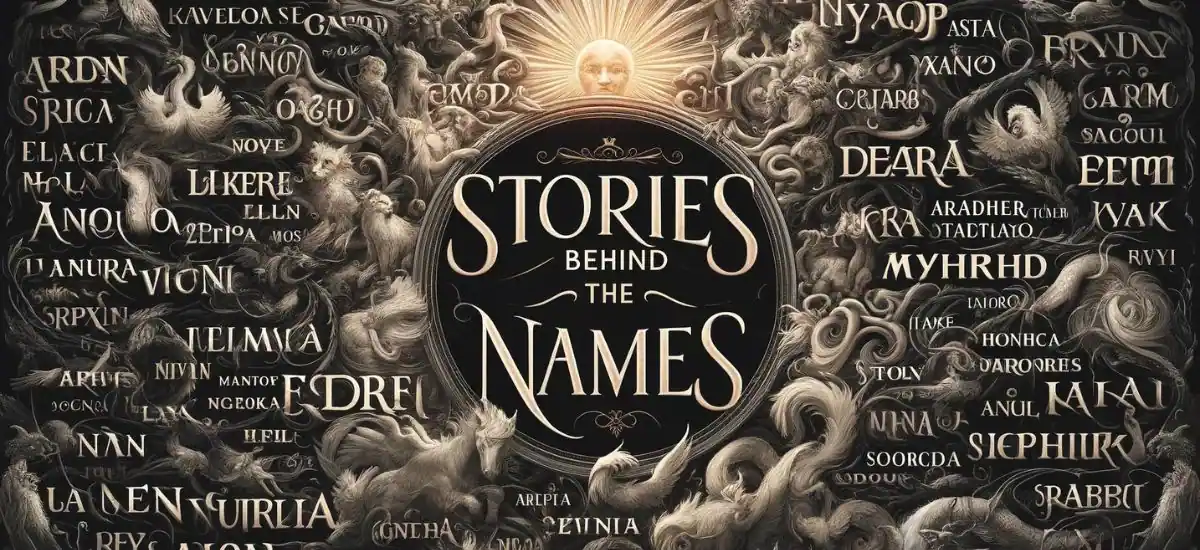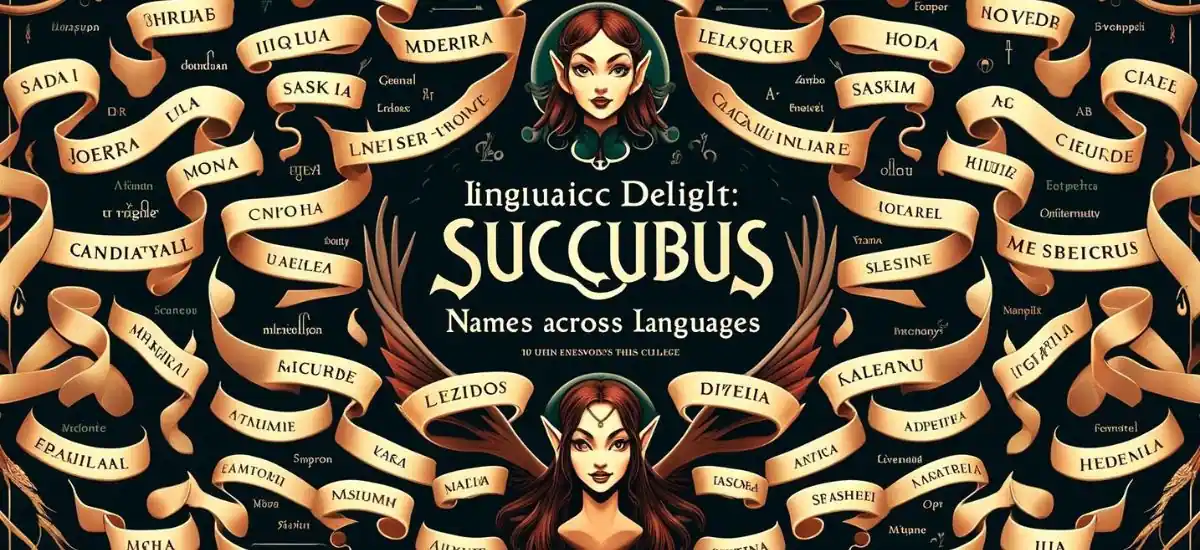Welcome to a whimsical world where myth waltzes with magic, a realm where the Succubus Names resonate with ancient allure and a sprinkle of mischief. For centuries, these legendary beings of folklore have danced through human imagination, captivating us with their enchanting tales.
Often depicted as bewitching women, succubi are celebrated for their mystical bonds and captivating personas. In this delightful escapade, we’ll frolic through the kaleidoscopic world of succubus names. Imagine names like Lilith, echoing with independence; Abyzou, whispering secrets of the night; and Naamah, resonating with grace and charm.
Each name is a key to a story, a portal to a world of fantasy and intrigue. Join us on this joyous journey as we unravel the origins, meanings, and the sheer delight these names bring to the rich tapestry of mythology and fantasy.
The Art Of Naming A Succubus: Ideas And Inspirations

Choosing a name for a succubus is an adventure in itself! Let’s embark on a creative quest to uncover names that resonate with mystique and allure. From the classic to the unconventional, each name holds a story waiting to be told.
- Lilith: Often regarded as the queen of succubi, Lilith’s name is synonymous with independence and power.
- Abyzou: A name with roots in ancient lore, whispering tales of the night.
- Naamah: A melodious name that dances on the tongue, embodying grace and mystery.
- Mara: A name steeped in the shadows of folklore, Mara embodies the essence of a nocturnal enchantress.
- Gremory: Often depicted in ancient texts, Gremory’s name conjures images of hidden knowledge and forbidden secrets.
- Vapula: This rare and intriguing name speaks of transformation and the unseen forces of nature.
- Rosier: A name that resonates with passion and desire, often associated with the allure of forbidden love.
- Agrat Bat Mahlat: A name from ancient scripts, echoing with the power of dance and the mysteries of the night.
- Eisheth Zenunim: A name that flows like a melody, symbolizing wisdom intertwined with deep seduction.
- Beleth: A regal name that commands attention, Beleth represents authority and the commanding presence of a queen.
- Decarabia: This name brings to mind the mysteries of the stars and the celestial dance of the cosmos.
- Stheno: A name with roots in Greek mythology, Stheno evokes strength and an unyielding spirit.
- Leraje: A harmonious blend of elegance and resilience, Leraje’s name is as intriguing as it is rare.
- Merihem: Whispering tales of ancient winds, Merihem’s name is synonymous with the elusive and the ethereal.
- Ronove: A name that suggests wisdom and depth, Ronove carries an air of ancient intellect.
- Sallos: Evoking the fluidity of water, Sallos’ name is associated with emotional depth and adaptability.
- Valefor: A name that conjures images of hidden paths and secret gateways, Valefor is a name of mystery and exploration.
- Verrier: A name that resonates with the natural world, symbolizing the deep connection between the earth and the mystical.
- Viné: A name that speaks of intertwining destinies and the complex tapestry of fate.
- Zepar: This name carries the allure of enchantment, often associated with the art of beguiling and captivating hearts.
- Bathin: A name that suggests a journey, Bathin embodies the spirit of exploration and discovery.
- Furfur: A whimsical name that hints at hidden depths beneath a playful exterior.
- Glasya-Labolas: A name that resonates with power and ancient wisdom, often associated with the guardians of forbidden knowledge.
- Malphas: This name evokes the majesty of ancient fortresses and the secrets they hold within.
- Raum: A name that speaks of vast spaces and the mysteries that lie beyond the horizon.
- Sabnock: This name brings to mind ancient guardians and the protective spirits of mystical realms.
- Shax: A name that whispers of the wind and the unseen forces that shape our world.
- Vepar: Evoking the depths of the ocean, Vepar’s name is synonymous with mystery and the unknown.
- Vual: A name that suggests ancient tales told by the fireside, Vual embodies the spirit of storytelling and tradition.
- Zagan: This name resonates with transformation and the alchemy of the spirit, symbolizing change and rebirth.
Each of these names carries its own unique magic and story, inviting us to delve deeper into the enchanting world of succubi and their rich lore.
Popular Succubus Names And Their Joyful Meanings
Each succubus name is a key to a treasure trove of stories and meanings. Let’s unlock these secrets and discover the joy hidden within.
| Name | Meaning | Origin |
| Lilith | “Night” | Mesopotamian |
| Naamah | “Pleasant” | Hebrew |
| Agrat Bat Mahlat | “Dance of the Night” | Jewish |
| Mara | “Bitterness” or “Sorrow” | Slavic |
| Gremory | “Strong Temptress” | Western |
| Vapula | “Powerful Spirit” | Western |
| Rosier | “Rose” or “Bringer of Love” | French |
| Eisheth Zenunim | “Woman of Whoredom” | Jewish |
| Beleth | “Powerful Queen” | Western |
| Decarabia | “Star of Secrets” | Western |
| Stheno | “Forceful” | Greek |
| Leraje | “Sharpshooter” | Western |
| Merihem | “Bringer of Plagues” | Western |
| Ronove | “Master of Languages” | Western |
| Sallos | “Moving Water” | Western |
| Valefor | “Valley Walker” | Western |
| Verrier | “Healer of the Earth” | Western |
| Viné | “Life Giver” | Western |
| Zepar | “Enchanter” | Western |
| Bathin | “Deep Understanding” | Western |
| Furfur | “Storm” | Western |
| Glasya-Labolas | “Insightful Warrior” | Western |
| Malphas | “Tower Builder” | Western |
| Raum | “Crow” or “Deceiver” | Western |
| Sabnock | “Builder of Fortresses” | Western |
| Shax | “Thief of Senses” | Western |
| Vepar | “Mermaid” or “Water Spirit” | Western |
| Vual | “Great Duke of Hell” | Western |
| Zagan | “Transformer” | Western |
| Abyzou | “Water Demon” | Near Eastern |
Each of these names is a gateway to a world of stories, myths, and legends, offering a glimpse into the diverse and rich tapestry of succubus lore.
From the ancient Near Eastern tales of Abyzou to the Western legends of Zagan, these names not only carry unique meanings but also reflect the cultural richness of the mythologies they originate from.
Uncovering Rare Gems: Lesser-Known Succubus Names
Beyond the well-trodden path lie names that are rare jewels in the succubus lore. These names, though less known, carry with them unique tales and enchanting mysteries.
- Andrasa: A name whispered in ancient corridors, symbolizing cunning and guile.
- Belili: Rooted in Sumerian mythology, Belili is associated with the celebration of life and the mysteries of the moon.
- Cresil: A name that evokes the defiance of convention, often linked to rebellion and change.
- Dybbuk: Originating from Jewish folklore, Dybbuk represents the spirit that clings to the physical world.
- Eurynome: A name from Greek mythology, symbolizing leadership and the power of the sea.
- Flauros: Flauros embodies the duality of fire – destruction and purification.
- Gorgo: A name that resonates with ancient Greek myths, representing strength and protection.
- Hecate: Rooted in Greek mythology, Hecate is the embodiment of magic, crossroads, and the night.
- Ipos: A name that suggests knowledge and boldness, often linked to the uncovering of secrets.
- Jezebeth: Symbolizing falsehood and lies, Jezebeth is a name that whispers of deceit.
- Kasdeya: From the Book of Enoch, Kasdeya is known as the teacher of all forbidden knowledge.
- Lamia: A name with Greek origins, representing the devourer of children and symbol of tragedy.
- Mastema: A name that embodies adversity and the testing of faith.
- Nyx: Rooted in Greek mythology, Nyx stands for the night and the unseen, a powerful force of nature.
- Orias: A name that symbolizes the majesty and vastness of the cosmos.
- Pandora: Known from Greek mythology, Pandora is synonymous with curiosity and the unexpected.
- Qalmana: A name from ancient texts, representing the essence of dark beauty and seduction.
- Raum: Often associated with destruction and reformation, Raum is a name of transformation.
- Sekhmet: From Egyptian mythology, Sekhmet represents the fierce and powerful aspects of the sun.
- Thamuz: An enigmatic name, often linked to mysteries and the unknown.
- Ukobach: A name that suggests the subtlety of flame and the art of crafting fire.
- Volac: Known for bestowing knowledge of hidden things, Volac is a name of enlightenment.
- Waldhexe: A Germanic name, Waldhexe embodies the spirit of the forest and natural magic.
- Xaphan: A name that crackles with the power of fire and rebellion.
- Yan-gant-y-tan: From Breton folklore, representing the wandering spirit and the flickering flame.
- Zephyr: A name that whispers of the west wind, symbolizing change and gentleness.
- Aeshma: A name from Zoroastrianism, embodying passion and wrath.
- Buer: A name that suggests healing and natural remedies, often linked to the knowledge of herbs.
- Cimejes: A name that resonates with strength and finding lost things.
- Dantalion: Symbolizing the mastery of thoughts and emotions, Dantalion is a name of intellect.
- Eligos: Known for uncovering hidden secrets and revealing the future.
- Furfur: A name that embodies the storm, representing both chaos and vitality.
- Gamigin: A name that suggests the depth of knowledge and the understanding of mortality.
- Haborym: Symbolizing the flame of destruction and renewal.
- Iymrith: A name from mythical tales, representing the power of illusion and mirage.
- Jikininki: From Japanese folklore, embodying the spirit of greed and corruption.
- Kokabiel: A name that resonates with the stars, often linked to celestial wisdom.
- Lilim: A name that is a derivative of Lilith, symbolizing the daughters of the night.
- Mammon: Often associated with greed and wealth, Mammon is a name of desire.
- Naberius: A name that suggests cunning and the art of persuasion, often linked to restoration and knowledge.
Each of these names carries with it a story untold, a mystery unsolved, adding to the rich tapestry of succubus lore. They invite us to explore the depths of mythology and the complexities of these enigmatic beings.
Stories Behind The Names:

- Gremory: Known in ancient texts as a powerful duchess, Gremory is often depicted as a wise and knowledgeable figure who reveals hidden treasures and secrets, symbolizing the pursuit of hidden knowledge.
- Vapula: This name is associated with a spirit of ingenuity and adaptability. Vapula is said to bestow profound skills in various crafts and sciences, embodying the power of transformation and growth.
- Andrasa: In lore, Andrasa is known for her cunning and strategic mind. She represents the art of strategy and the ability to navigate through life’s complexities with grace and intelligence.
- Belili: Rooted in Sumerian mythology, Belili is a goddess of the earth and the moon. Her story is one of connection with nature and the cycles of life and death, embodying the eternal dance of the natural world.
- Cresil: Often depicted as a defiant spirit, Cresil’s story is about challenging the status quo and breaking free from constraints, symbolizing rebellion and the quest for personal freedom.
- Dybbuk: In Jewish folklore, a Dybbuk is a restless spirit that clings to the living world. It represents unresolved issues and the importance of spiritual closure.
- Eurynome: A powerful deity from Greek mythology, Eurynome is the goddess of all things. Her story tells of creation and leadership, symbolizing the power of femininity and the sea.
- Flauros: Flauros is known for his dual nature, representing both destruction and purification. His story is about the transformative power of fire and the balance between creation and destruction.
- Gorgo: Inspired by the Gorgons of Greek mythology, Gorgo symbolizes protection and strength. Her story is about overcoming fear and harnessing inner power.
- Hecate: Hecate’s tale is one of magic, crossroads, and choices. As a goddess of the night, she guides souls and offers protection, embodying wisdom and the unseen.
- Ipos: Known for his boldness and insight, Ipos’s story is about the courage to seek truth and the wisdom to understand the secrets of the universe.
- Jezebeth: A symbol of deception, Jezebeth’s tale is a cautionary one about the consequences of falsehood and the importance of honesty.
- Kasdeya: From the Book of Enoch, Kasdeya is known as a teacher of forbidden knowledge. Her story represents the allure and danger of seeking what is hidden.
- Lamia: In Greek mythology, Lamia’s tragic story is one of loss and transformation. She embodies the pain of grief and the destructive nature of vengeance.
- Mastema: Mastema’s tale is about adversity and the testing of faith. He represents the challenges that refine and define one’s character.
- Nyx: As the personification of the night, Nyx’s story is about the mysteries of darkness and the unseen forces that shape our world.
- Orias: Orias’s tale is about the vastness of the cosmos and the exploration of the unknown, symbolizing the quest for cosmic knowledge and understanding.
- Pandora: Her story, famous in Greek mythology, is about curiosity and the unforeseen consequences of actions, representing the complexity of human nature.
- Qalmana: A name from ancient texts, Qalmana’s story is about the allure of beauty and the power of seduction, symbolizing the dual nature of attraction.
- Raum: Raum’s tale is one of transformation and change. He is often associated with the ability to cause or undo destruction, symbolizing the cyclical nature of creation and destruction.
Each of these names not only carries a unique sound but also a rich narrative, weaving together the threads of mythology, folklore, and legend into a captivating tapestry of succubus lore.
Succubi In Modern Media: A Happy Influence
Succubi have gracefully transitioned from ancient texts to the heart of modern media, casting their spell in movies, books, and games. Their names often carry a sense of mystery and allure, perfectly fitting for characters that captivate audiences worldwide.
Morrigan Aensland: A name that resonates with power and charisma, featured in the video game series ‘Darkstalkers’.
Mazikeen: From the TV series ‘Lucifer’, a name that blends mischief with a touch of danger.
| Video Games | TV Series | Movies | Literature | Comics/Graphic Novels |
| Morrigan Aensland (Darkstalkers) | Mazikeen (Lucifer) | Lilith (Borderlands) | Lilitu (The Stormcaller) | Purgatori (Chaos! Comics) |
| Lilith (Diablo) | Bo (Lost Girl) | Akasha (Queen of the Damned) | Carmilla (Carmilla) | Satana (Marvel Comics) |
| Bayonetta (Bayonetta) | Ruby (Supernatural) | Santanico Pandemonium (From Dusk Till Dawn) | Rosier (The Delicate Dependency) | Raven (DC Comics) |
| Trish (Devil May Cry) | Lilith (Supernatural) | Veruca (Buffy the Vampire Slayer) | Leanan Sidhe (Wicked Lovely) | Lady Death (Chaos! Comics) |
| Catherine (Catherine) | Madison (American Horror Story) | Selene (Underworld) | Georgina Kincaid (Succubus Blues) | Death (Sandman) |
| Lilith (Borderlands) | Fiona (The Vampire Diaries) | Lily (V/H/S) | Tanda (Another Fine Myth) | Magik (Marvel Comics) |
| Rayne (BloodRayne) | Carmilla (Carmilla) | Jennifer (Jennifer’s Body) | Ysandre (Kushiel’s Dart) | Witchblade (Witchblade) |
| Jeanne (Bayonetta) | Glory (Buffy the Vampire Slayer) | Ginger (Ginger Snaps) | Lamia (Stardust) | Enchantress (Marvel Comics) |
| Ivy (Soulcalibur) | Anya (Buffy the Vampire Slayer) | Eve (Species) | Sabrina (Sabrina, the Teenage Witch) | Lilith (Darkstalkers) |
| Tira (Soulcalibur) | Drusilla (Buffy the Vampire Slayer) | Sil (Species) | Mircalla (Carmilla) | Mystique (Marvel Comics) |
Each of these names not only adds a layer of intrigue and allure to the characters they represent but also reflects the enduring fascination with the mythos of succubi in contemporary culture.
From the enchanting Morrigan Aensland in “Darkstalkers” to the mysterious Mazikeen in “Lucifer,” these characters continue to captivate audiences with their unique blend of charm, power, and mystique.
Crafting Your Own Succubus Character With Glee
Creating a succubus character is a delightful journey of imagination. Whether for a novel, a role-playing game, or just for fun, here’s how to infuse your character with the essence of a succubus:
- Choose a Name: Begin by selecting a name that reflects her personality. Is she mischievous, seductive, wise, or rebellious?
- Define Her Powers: Consider the supernatural abilities your succubus possesses. Does she weave dreams, inspire creativity, or have dominion over shadows?
- Develop Her Backstory: Every succubus has a tale. What’s hers? Is it a tragic romance, a quest for knowledge, or a rebellion against ancient rules?
- Determine Her Appearance: Decide on her physical features – does she have fiery red eyes hinting at her otherworldly nature, or wings that unfurl in the moonlight? Consider how her appearance might change or adapt in different situations or environments.
- Establish Her Realm: Where does your succubus character call home? Is it a shadowy netherworld, a luxurious palace in an infernal dimension, or does she blend into the human world, hiding her true nature?
- Define Her Relationships: Consider the connections your succubus has with other characters or entities. Does she have allies, adversaries, or complicated relationships that shape her story?
- Craft Her Motivations and Goals: What drives your succubus character? Is she seeking redemption, power, love, or something entirely unique? Understanding her motivations will guide her actions and decisions in your story, making her a more rounded and compelling character.
By considering these additional aspects, you can create a succubus character that is not only intriguing and multifaceted but also deeply integrated into the world and story you are creating.
Cultural Fiesta: Succubi Around The World

Succubi are not bound by one culture; they are global phenomena, each culture adding its unique flavor to their lore. Let’s take a whirlwind tour around the world to explore these diverse interpretations.
| European | Middle Eastern | Asian | African | American |
| Lilith (Hebrew) | Abyzou (Near Eastern) | Yakshini (Indian) | Adze (Ewe) | Xtabay (Mayan) |
| Melusine (French) | Lamashtu (Assyrian) | Huli Jing (Chinese) | Popobawa (Swahili) | La Llorona (Mexican) |
| Empusa (Greek) | Qarinah (Egyptian) | Gwisin (Korean) | Asanbosam (Ashanti) | Soucouyant (Caribbean) |
| Rusalka (Slavic) | Jinniyya (Islamic) | Kumiho (Korean) | Tikoloshe (Zulu) | Ciguapa (Dominican) |
| Baobhan Sith (Scottish) | Lilu (Mesopotamian) | Nure-onna (Japanese) | Obayifo (Ashanti) | La Siguanaba (Salvadoran) |
| Lamia (Greek) | Al Basti (Turkish) | Penanggalan (Malaysian) | Mami Wata (West African) | Deer Woman (Native American) |
| Leanhaum-Shee (Irish) | Ghoul (Arabian) | Sundel Bolong (Indonesian) | Inkanyamba (Zulu) | Churel (Native American) |
| Striga (Balkan) | Si’lat (Islamic) | Rokurokubi (Japanese) | Anansi (Akan) | White Buffalo Woman (Lakota) |
| Nachzehrer (German) | Umm al-Duwayce (Arabian) | Jiangshi (Chinese) | Azeman (Surinamese) | Wendigo (Algonquian) |
| Vila (Slavic) | Jinn (Islamic) | Tengu (Japanese) | Loup-garou (Haitian) | Skinwalker (Navajo) |
Each of these names not only represents a succubus-like entity but also reflects the cultural context and folklore from which it originates. From the feared Empusa of Greek mythology to the shape-shifting Skinwalkers of Navajo legend, these entities embody the fears, beliefs, and storytelling traditions of their respective cultures, offering a fascinating glimpse into the world’s diverse mythological tapestry.
Folklore And Legends: A Journey Through Time
The tales of succubi are as old as time, evolving through the ages. This section delves into how these legends have changed, adapting to the societies that told them.
Then and Now Comparison Table:
| Era | Perception of Succubi |
| Ancient Times | Spirits of the night, often feared |
| Medieval Period | Demons of temptation, featured in cautionary tales |
| Modern Day | Complex characters, often seen in a more sympathetic light |
| Renaissance | Mystical beings, associated with witchcraft and heresy |
| Victorian Era | Symbolic of repressed sexuality and hidden desires |
| Early 20th Century | Marginalized figures, often linked to mental illness or hysteria |
| Mid-20th Century | Icons of forbidden allure, appearing in horror and fantasy genres |
| Late 20th Century | Feminist symbols, representing empowerment and liberation |
| Early 21st Century | Characters in urban fantasy, blending the supernatural with modern settings |
| Contemporary | Diverse representations, ranging from villainous to heroic figures |
Each era’s perception reflects the societal norms, fears, and values of the time, showing how the concept of succubi has been a mirror to human culture throughout history.
From feared spirits of the night in ancient times to complex and diverse characters in contemporary media, succubi have continually adapted, reflecting the ever-changing human psyche and societal attitudes.
Also Know About: TuneTrove: Spotify Playlist Names To Rock Your Ears
Exploring Gender Dynamics In Succubus Mythology
Succubi often challenge traditional gender roles, offering a unique perspective on femininity and power. This section explores how succubi have been portrayed over time and what they represent in terms of gender dynamics.
- Lilith: Often considered the first succubus, Lilith challenges traditional gender roles by embodying independence and defiance against male dominance.
- Naamah: Represents the seductive power of women, often seen as a symbol of dangerous allure and the complexity of female sexuality.
- Agrat Bat Mahlat: Portrayed as a free spirit, she symbolizes women’s liberation from societal constraints and the celebration of their desires.
- Mara: In Slavic folklore, Mara is a figure of nightmares, representing the fear of the uncontrollable aspects of femininity.
- Gremory: Known for her wisdom, Gremory challenges the stereotype of women as solely nurturers, embodying knowledge and power.
- Rosier: Often associated with romantic love, Rosier represents the dual nature of femininity – nurturing yet powerful.
- Eisheth Zenunim: A figure of both beauty and intelligence, she challenges the notion that women must be confined to a single role.
- Beleth: As a queen in demonology, Beleth subverts traditional gender roles, symbolizing authority and leadership typically associated with masculinity.
- Lamia: Her story is a tragic one, highlighting the societal fear of women’s autonomy and the demonization of maternal figures.
- Hecate: A goddess of witchcraft, Hecate embodies the wisdom and strength of women, often seen as a protector of the marginalized.
- Morgan le Fay: A powerful enchantress in Arthurian legend, Morgan represents the fear and fascination with women’s mastery over magic and knowledge.
- Salome: Known for her dance of the seven veils, Salome symbolizes the power of female sexuality and its impact on male authority.
- Circe: A sorceress in Greek mythology, Circe represents the fear of women’s control over men, turning them into animals with her potions.
- Baba Yaga: A complex figure in Slavic folklore, she embodies the duality of nurturing and punishing, challenging the one-dimensional portrayal of women.
- Kali: In Hindu mythology, Kali’s fearsome appearance and power represent the untamed nature of femininity and the cycle of creation and destruction.
- Pandora: Her story is often seen as a cautionary tale about female curiosity and disobedience, reflecting societal anxieties about women’s autonomy.
- Medusa: Once a beautiful maiden, Medusa’s transformation and power symbolize the vilification of female rage and strength.
- Freya: In Norse mythology, Freya’s roles as a goddess of love and war challenge the notion of femininity as passive or gentle.
- Ishtar: An ancient Mesopotamian goddess, Ishtar embodies love, war, and sexuality, breaking the boundaries of traditional female roles.
- Valkyries: In Norse mythology, these female figures who choose the slain warriors for Valhalla represent the empowerment and complexity of women in roles traditionally associated with men.
Each of these figures, drawn from various mythologies, illustrates the evolving perceptions of femininity, power, and gender roles, reflecting the societal and cultural contexts in which they were conceived.
Linguistic Delight: Succubus Names Across Languages

The allure of succubi transcends language barriers, with their names taking on beautiful forms in different tongues. This linguistic journey reveals how each culture shapes its version of these enchanting beings.
Multilingual Chart:
| Language | Name | Meaning |
| English | Lilith | “Night” |
| Japanese | Aka Manto | “Red Cape” |
| Russian | Rusalka | “Mermaid” or “Water Nymph” |
| French | Melusine | “Water Spirit” |
| German | Alpdrücke | “Nightmare” |
| Chinese | Nü Gui | “Female Ghost” |
| Spanish | La Siguanaba | “Mysterious Woman” |
| Arabic | Qarinah | “Spirit Companion” |
| Hebrew | Shedim | “Demon” |
| Greek | Empusa | “One-Footed” |
| Italian | Strega | “Witch” |
| Korean | Gumiho | “Nine-Tailed Fox” |
| Hindi | Churel | “Female Ghost” |
| Swedish | Mara | “Nightmare” |
| Turkish | Alkarısı | “Red Woman” |
| Indonesian | Sundel Bolong | “Hole in the Back” |
| Portuguese | Bruxa | “Witch” |
| Thai | Krasue | “Floating Head” |
| Yoruba (Nigerian) | Ayara | “Flying Witch” |
| Zulu (South African) | Tikoloshe | “Water Sprite” |
Each name in this chart not only represents a linguistic variation but also reflects the cultural nuances and mythological interpretations unique to each region. From the haunting ‘Nü Gui’ in Chinese folklore to the mysterious ‘Tikoloshe’ in Zulu mythology, these names embody the rich tapestry of global succubus lore.
Astrological Connections: Stars And Succubi
The cosmos and succubi share a mystical bond, with astrological signs often influencing the traits associated with these entities. This section explores how succubus names and characteristics align with the stars.
Astrological Chart:
| Succubus Name | Star Sign | Traits |
| Lilith | Scorpio | Mysterious, Intense |
| Naamah | Libra | Charming, Balanced |
| Agrat Bat Mahlat | Aries | Bold, Adventurous |
| Eisheth Zenunim | Aquarius | Independent, Unconventional |
| Gremory | Taurus | Sensual, Determined |
| Rosier | Pisces | Romantic, Dreamy |
| Beleth | Leo | Commanding, Proud |
| Vapula | Gemini | Intellectual, Adaptable |
| Mara | Cancer | Emotional, Intuitive |
| Abyzou | Virgo | Analytical, Methodical |
| Lamashtu | Capricorn | Ambitious, Disciplined |
| Hecate | Sagittarius | Wise, Freedom-Loving |
| Jezebeth | Scorpio | Seductive, Secretive |
| Lamia | Libra | Enchanting, Harmonious |
| Merihem | Aries | Courageous, Energetic |
| Ronove | Taurus | Reliable, Patient |
| Sallos | Pisces | Empathetic, Artistic |
| Valefor | Gemini | Curious, Versatile |
| Verrier | Cancer | Nurturing, Protective |
| Viné | Virgo | Practical, Analytical |
This chart offers a unique perspective on how the characteristics of these mythical beings can be interpreted through the lens of astrology. Each succubus name, when paired with a star sign, reveals a set of traits that adds depth and dimension to their mythological profiles.
From the bold and adventurous spirit of Agrat Bat Mahlat under Aries to the wise and freedom-loving nature of Hecate in Sagittarius, these astrological connections provide a captivating way to understand and relate to these enigmatic entities.
Symbolism Unveiled: The Hidden Meanings
Beyond their names, succubi are rich in symbolism, representing various aspects of life, nature, and the human psyche. This section decodes the symbols associated with different succubus names.
- Lilith: Symbolizes independence and defiance against societal norms, representing the untamed aspect of nature and the human spirit.
- Naamah: Embodies seduction and charm, representing the allure and complexity of human desires.
- Agrat Bat Mahlat: Represents unrestrained freedom and the joy of living, symbolizing the celebration of life’s pleasures.
- Eisheth Zenunim: Symbolizes wisdom and sensuality, embodying the balance between knowledge and desire.
- Gremory: Represents hidden knowledge and the pursuit of truth, symbolizing the quest for understanding the mysteries of life.
- Rosier: Embodies romantic love and passion, representing the intense emotions and connections between people.
- Beleth: Symbolizes power and authority, representing the strength and leadership qualities often associated with femininity.
- Vapula: Represents adaptability and transformation, symbolizing the ability to navigate and embrace change.
- Mara: Embodies the fears and anxieties of the human mind, representing the darker aspects of the subconscious.
- Abyzou: Symbolizes envy and the destructive nature of jealousy, representing the darker side of human emotions.
- Lamashtu: Represents chaos and destruction, embodying the unpredictable and often destructive forces of nature.
- Hecate: Symbolizes crossroads and choices, representing the critical decisions and turning points in life.
- Jezebeth: Embodies deceit and falsehood, symbolizing the consequences of dishonesty and manipulation.
- Lamia: Represents loss and vengeance, symbolizing the pain of grief and the destructive nature of revenge.
- Merihem: Symbolizes plague and decay, representing the inevitable decline and the cycle of life and death.
- Ronove: Embodies eloquence and persuasion, symbolizing the power of communication and influence.
- Sallos: Represents emotional depth and intuition, symbolizing the complexity and depth of human emotions.
- Valefor: Symbolizes exploration and discovery, representing the human quest for knowledge and adventure.
- Verrier: Embodies healing and restoration, symbolizing the capacity for recovery and renewal.
- Viné: Represents life and creation, symbolizing the generative and creative forces in nature and humanity.
- Zepar: Embodies enchantment and allure, representing the power of attraction and seduction.
- Bathin: Symbolizes knowledge and understanding, representing the pursuit of wisdom and enlightenment.
- Furfur: Represents the storm and chaos, symbolizing the tumultuous and unpredictable aspects of life.
- Glasya-Labolas: Embodies insight and strategy, representing the importance of foresight and planning.
- Malphas: Symbolizes construction and creation, representing the human ability to build and create.
- Raum: Represents transformation and change, symbolizing the ever-changing nature of life and circumstances.
- Sabnock: Embodies protection and fortitude, symbolizing the strength to defend and preserve.
- Shax: Represents perception and understanding, symbolizing the ability to see beyond the surface.
- Vepar: Symbolizes the depths and mysteries, representing the unknown and hidden aspects of life.
- Zagan: Embodies transformation and alchemy, representing the power of change and the ability to turn situations around.
Each of these names carries a wealth of symbolic meaning, offering a window into the diverse interpretations and representations of succubi in mythology and folklore.
Modern Magic: Succubi In Contemporary Practices
In modern spiritual and occult practices, succubi names are often invoked for various purposes, from personal empowerment to exploring the shadow self. This section delves into how these ancient beings are perceived and utilized today.
| Empowerment | Shadow Work | Protection | Knowledge | Sensuality |
| Lilith | Hecate | Gremory | Agrat Bat Mahlat | Naamah |
| Beleth | Jezebeth | Malphas | Ronove | Rosier |
| Vapula | Lamia | Sabnock | Shax | Eisheth Zenunim |
| Merihem | Mara | Valefor | Viné | Abyzou |
| Zepar | Lamashtu | Raum | Buer | Sallos |
| Decarabia | Nyx | Andrasa | Orias | Verrier |
| Furfur | Kali | Glasya-Labolas | Bathin | Zagan |
| Cimejes | Pandora | Flauros | Ipos | Circe |
| Dantalion | Medusa | Stolas | Paimon | Morgan le Fay |
| Sitri | Persephone | Belial | Berith | Asmodeus |
Each name in this table is associated with specific aspects of modern magical practices:
- Empowerment: Names like Lilith and Beleth are invoked for personal strength, confidence, and empowerment.
- Shadow Work: Names such as Hecate and Jezebeth are used in exploring and integrating the shadow self.
- Protection: Entities like Gremory and Malphas are called upon for protection and defense against negative energies.
- Knowledge: Names like Agrat Bat Mahlat and Ronove are sought for wisdom, learning, and uncovering hidden truths.
- Sensuality: Succubi like Naamah and Rosier are invoked for exploring sensuality, passion, and intimate connections.
These categorizations reflect the diverse roles that these ancient beings play in contemporary spiritual practices, highlighting the enduring relevance and adaptability of their mythos in modern contexts.
Tips for Incorporation: Learn how to respectfully and effectively include succubus lore in your personal rituals, whether for meditation, creative inspiration, or self-discovery.
- Research Thoroughly: Before invoking any succubus name, ensure you understand its history and symbolism. This knowledge will help you connect more deeply and respectfully with the entity.
- Set Clear Intentions: Be clear about why you are invoking a succubus. Whether it’s for self-discovery, creative inspiration, or another purpose, your intention should be specific and focused.
- Create a Sacred Space: Designate a special area for your rituals. This space should be clean, comfortable, and free from distractions, allowing you to fully immerse in the experience.
- Use Symbolic Objects: Incorporate items that resonate with the energy of the succubus you are working with. This could include candles, crystals, or images that symbolize the qualities of the entity.
- Practice Mindfulness and Respect: Approach your rituals with a sense of reverence and openness. Be mindful of the energies you are working with and show respect to the lore and the entity you are invoking.
Remember, the key to successful incorporation of succubus lore into your rituals is a combination of respect, understanding, and clear intention.
Frequently Asked Questions
Q1: What is the origin of succubus names?
Answer: Succubus names have diverse origins, often rooted in ancient mythologies, folklore, and cultural beliefs from around the world. They reflect the unique characteristics and qualities associated with these alluring beings.
Q2: Can succubus names be used in modern spiritual practices?
Answer: Yes, succubus names can be incorporated into contemporary rituals for various purposes, such as meditation, self-discovery, or creative inspiration. It’s essential to approach this with respect and intention.
Q3: Are all succubus names associated with dark or negative energies?
Answer: No, succubus names encompass a wide range of attributes, from sensuality to wisdom. While some may have darker connotations, others represent empowerment, protection, and creativity.
Q4: How can I explore succubus lore without disrespecting cultural beliefs?
Answer: To explore succubus lore respectfully, research thoroughly, set clear intentions, and create a sacred space for your practices. Approach the subject with mindfulness and respect for the cultural significance it holds.
Conclusion:
As we conclude our mesmerizing exploration of succubus names, we celebrate the intricate tapestry they weave in our cultural and mythological landscapes. These names, rich in story and symbolism, bridge ancient lore with contemporary narratives, showcasing the timeless allure of these enigmatic beings.
They remind us of the potent blend of mystery, power, and sensuality inherent in mythology, inviting us to continually rediscover and reinterpret their meanings. Succubi, in all their multifaceted glory, inspire us to embrace the joy of exploration and the endless possibilities of imagination, proving that myths, like their names, are ever-evolving, captivating threads in the fabric of human history.
Read More: Guardians Of The Ruby Flame: 457+ Redguard Names Inspiration




Leave a Reply
You must be logged in to post a comment.